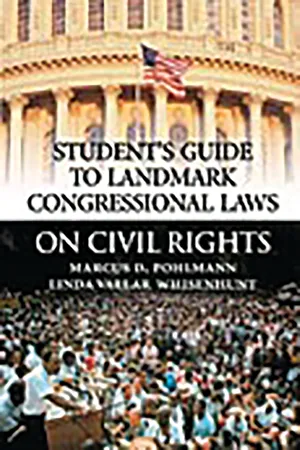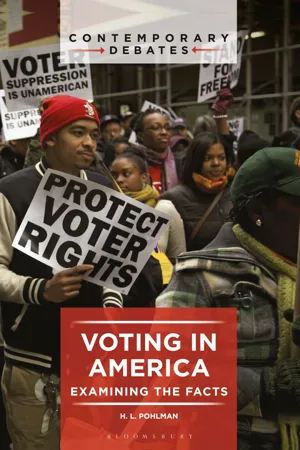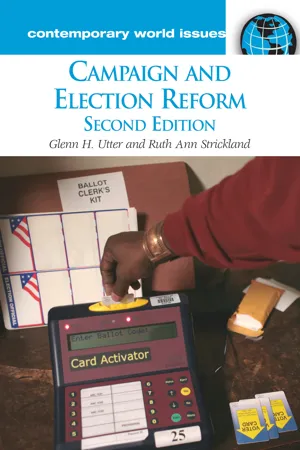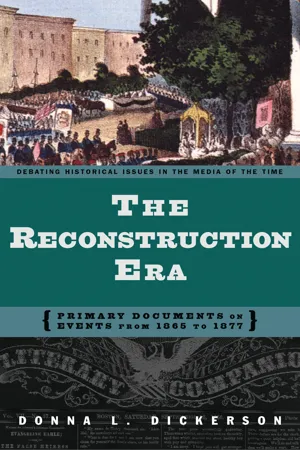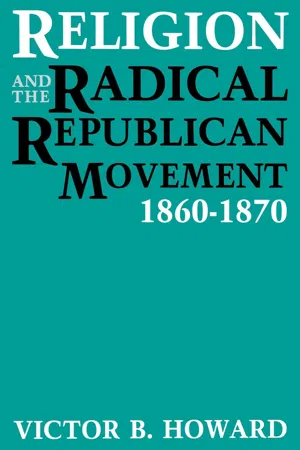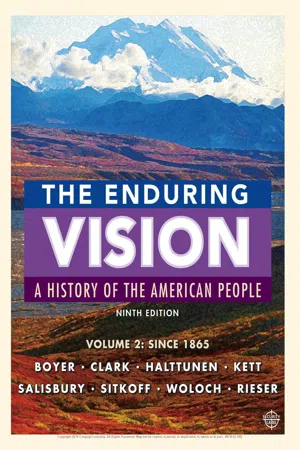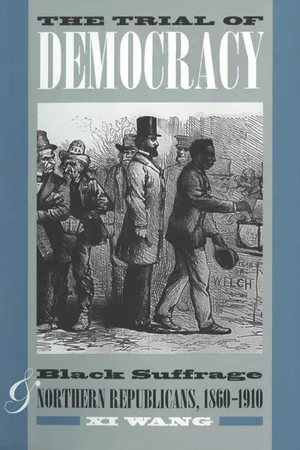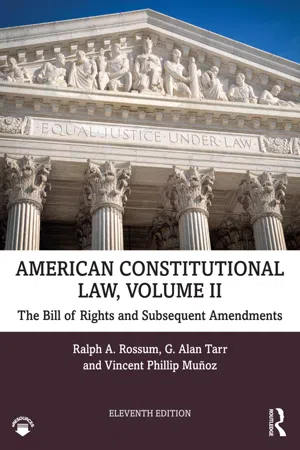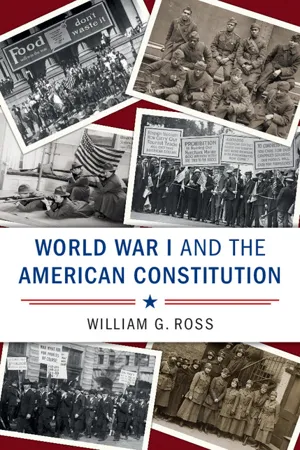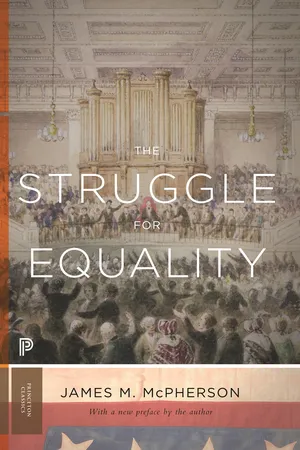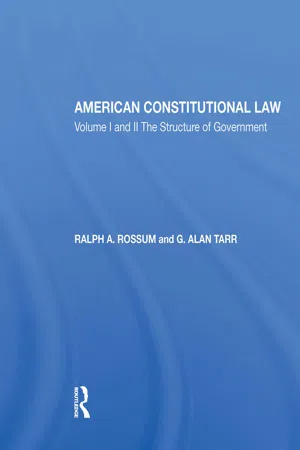History
15th Amendment
The 15th Amendment to the United States Constitution, ratified in 1870, granted African American men the right to vote. It aimed to ensure that race would not be a barrier to voting, although it was not fully enforced until the Voting Rights Act of 1965. The amendment was a significant step towards addressing racial inequality and expanding democratic rights in the United States.
Written by Perlego with AI-assistance
Related key terms
1 of 5
11 Key excerpts on "15th Amendment"
- Marcus D. Pohlmann, Linda Vallar Whisenhunt(Authors)
- 2002(Publication Date)
- Greenwood(Publisher)
It would take decades before such practices were struck down by the United States Supreme Court 4 ; outlawed by constitutional amendment, for example, the Twenty-fourth Amendment passed in 1964; or reigned in by acts of Congress, for example, the 1870 Enforcement Act, the 1957 and 1964 Civil Rights Acts, and the 1965 Voting Rights Act. FIFTEENTH AMENDMENT 105 THE LAW The Fifteenth Amendment prohibits the denial of any United States citizen's right to vote on the basis of that person's race, color, or prior status as a slave. Furthermore, it grants Congress the au- thority to pass any laws necessary to enforce the amendment. 18. Fifteenth Amendment Section 1. The right of citizens of the United States to vote shall not be denied or abridged by the United States or by any State on account of race, color, or previous condition of servitude. Section 2. The Congress shall have power to enforce this article by appropriate legislation. NOTES 1. For example, see John M. Mathews, Legislative and Judicial History of the 15th Amendment (Baltimore: Johns Hopkins Press, 1909). 2. For example, see Susan Banfield, The 15th Amendment (Berkeley Heights, N.J.: Enslow Publishers, 1998). 3. United States v. Reese, 92 U.S. 214 (1876). 4. For example, see Nixon V Herndon, 273 U.S. 536 (1927); Nixon v. Condon, 286 U.S. 73 (1932); Smith v. Allwright, 321 U.S. 649 (1944), which strike down white primaries. For a fuller listing of the various federal court decisions spelling out these interpretations, see Edward S. Corwin, The Constitution and What It Means Today (Princeton, N.J.: Princeton University Press, 1978), pp. 532-39. 19 Enforcement Act 1870 The Enforcement Act established federal sanctions for interfering with another person's civil rights, especially a black's right to vote. It also allowed for federal election supervisors to oversee registra- tion and voting procedures.- eBook - ePub
Voting in America
Examining the Facts
- H. L. Pohlman(Author)
- 2020(Publication Date)
- ABC-CLIO(Publisher)
Ratified in February 1870, the Fifteenth Amendment formally granted male African American citizens the right to vote in federal and state elections, but this right was in practice nullified to a great extent following the disputed election of 1876. In this electoral contest, Republican candidate Rutherford B. Hayes won the electoral vote by promising to end Reconstruction and withdraw federal troops from the South (see Q4). FURTHER READING Avins, Alfred. The Reconstruction Amendments’ Debate The Legislative History and Contemporary Debates in Congress on the 13th, 14th, and 15th Amendments. Richmond, VA: Virginia Commission on Constitutional Government, 1967. Basler, Roy P., ed. The Collected Works of Abraham Lincoln. Ann Arbor, MI: University of Michigan Digital Library, 2001, initially published by The Abraham Lincoln Association, 1953, Vol. VII, pp. 101–102 (Letter to James S. Wadsworth, January 1864), available at http://abrahamlincolnassociation.org/lincoln-repository/collected-works/. Bell, Derrick. Race, Racism and American Law. 6th ed. New York: Aspen Publishers, 2008. Cantu, Edward. “Normative History and Congress’s Enforcement Power under the Reconstruction Amendments.” Texas Review of Law and Politics 21 (2016): 119–199. Foner, Eric. The Second Founding: How the Civil War and Reconstruction Remade the Constitution. New York: Norton, 2019. Keyssar, Alexander. The Right to Vote: The Contested History of Democracy in the United States. Revised ed. New York: Basic Books, 2009. Lincoln, Abraham. “The Emancipation Proclamation.” January 1, 1863, available at https://www.ourdocuments.gov/doc.php?flash=false&doc=34&page=transcript. Q4. DID THE RATIFICATION OF THE FIFTEENTH AMENDMENT IN 1870 END THE PRACTICE OF STATES DENYING OR ABRIDGING THE RIGHT OF AFRICAN AMERICAN MEN TO VOTE IN FEDERAL OR STATE ELECTIONS? Answer: No - eBook - PDF
Campaign and Election Reform
A Reference Handbook
- Glenn H. Utter, Ruth Ann Strickland(Authors)
- 2008(Publication Date)
- ABC-CLIO(Publisher)
The Fifteenth Amendment specifically guaranteed the right to vote for former male slaves. The national Constitution notwithstanding, South- ern states were able to deny voting rights to African Americans during the later years of the 19th century and the first decades of 2 Background and History the twentieth by instituting what many Southern whites consid- ered voter registration reforms. Such strategies as the literacy test, good character requirements that disfranchised those con- victed of certain crimes, the grandfather clause that exempted many whites from voter registration requirements, and intimida- tion virtually eliminated minority voting in Southern states. At the same time that black men were being denied the right to vote, women were crusading for the franchise. To a cer- tain extent, the women’s rights movement in the United States grew out of the antislavery cause. Elizabeth Cady Stanton, the wife of an abolitionist leader, organized the first women’s rights convention in Seneca Falls, New York, in 1848. During the Civil War, Stanton and Susan B. Anthony established the National Woman’s Loyal League to lobby for what became the Thirteenth Amendment, ratified in December 1865, which prohibited slav- ery. Following the Civil War, many in the women’s rights move- ment expected that women would be granted the franchise along with black men. However, the more cautious supporters of black suffrage believed that combining their goal with the push for woman suffrage would jeopardize both causes. In 1869 rival woman suffrage organizations were established: the more radi- cal National Woman Suffrage Association, based in New York, which called for immediate nationwide enfranchisement of women, and the more conservative American Woman Suffrage Association, headquartered in Boston, which was more willing to accept the precedence of black suffrage. The two organiza- tions combined in 1890 to form the National American Woman Suffrage Association. - eBook - PDF
The Reconstruction Era
Primary Documents on Events from 1865 to 1877
- Donna L. Dickerson(Author)
- 2003(Publication Date)
- Greenwood(Publisher)
When the secretary of state reported on March 30, 1870, that the Fif- teenth Amendment had been ratified, Grant told the country that the amendment "creates the greatest civil change and constitutes the most im- portant event that has occurred since the nation came into life." 4 There was great rejoicing, and celebrations were held across the country. Blacks saw the Fifteenth Amendment as their salvation, Democrats saw the amendment as the instrument that would finally put the "negro question" to rest, and Republicans saw the amendment as the end of the their work for blacks. Even the antislavery societies began to disband, believing the amendment placed the finishing touch on the work they had begun 40 years earlier. But President Grant knew that having the vote and keeping the vote were very different issues. No sooner had the new amendment been ratified than fresh outbreaks of violence marred the spring elections of 1870. State authorities dragged their feet in making arrests or pursuing prosecutions. Black witnesses were afraid to give testimony, white jurors would not con- vict, and jury and witness tampering were widespread. Aside from violence, Democrats used bribery, fraud, and trickery to throw elections. Democratic election officials in the North and South were not above moving, closing or even eliminating polling places, or refusing to accept poll taxes from blacks. State legislatures gerrymandered districts to neutralize the black vote, es- tablished literacy tests, and even shifted elected positions to appointive to control who held political positions. In the face of escalating violence in the South and vote fraud in the North, a Republican Congress moved quickly to pass the first Enforcement Act of May 31, 1870. The law prohibited bribery, threats, and intimidation Black Suffrage, 1869-77 293 of voters; prohibited disguised groups from interfering with constitutional rights; and prohibited employers from withholding jobs in order to ob- struct voting. - Victor B. Howard(Author)
- 2021(Publication Date)
- The University Press of Kentucky(Publisher)
41Despite all of the optimism that the radical Christian held for the Fifteenth Amendment as a cure-all for the problems of black rights, it proved to be less significant than the Fourteenth Amendment for all people whose rights would be threatened in the future. This statement was true although the moderate Republicans viewed the Fourteenth Amendment as a makeshift party platform in 1866, but the Radicals and the majority of Republican voters looked on the black man and not their party as the main beneficiary of the Fourteenth Amendment.With the adoption of the Fifteenth Amendment, many radical Republicans considered their work to be completed and the Northern Republican party began to abandon its preoccupation with the Southern reconstruction issue soon after the election of 1866. With the adoption of the Fifteenth Amendment there was widespread acceptance of the belief that radicalism was superfluous; the Negro could now take care of himself, and there was no further need for vigilance.42 In August 1869 the Commonwealth took issue with the talk about the mission of the Republican party being ended. The editor argued that the spirit of rebellion was reviving and that much work remained to be done. The feeble attempt to restore life to the radical movement was emasculated by the Supreme Court when it rendered the decisions in the Cruikshank and Reese cases in 1876 and the Civil Rights and Harris cases in 1883, leaving little for the federal government to enforce in the Fourteenth Amendment and Fifteenth Amendment for half a century.43 The reconstruction measures, however, proved to be the starting point for modern civil rights law and policy, and the Fourteenth and Fifteenth amendments provided the legal foundations for significant changes in the status of blacks in the twentieth century.44 In An American Crisis , W.R. Brock criticizes the Fifteenth Amendment as a racial proposition rather than a universal one, meaning that the majority of the nation had no particular interest in its enforcement because it failed to link the self-interest of white Americans with their ideological commitment to equal rights as the Fourteenth Amendment did.45 Although the Fifteenth Amendment was narrow in its scope and a negatively worded measure that was largely nullified in the 1870s and 1880s, the radicals should be credited for their “vision of the equality of all citizens” and for the foundations they erected for the “achievement of their goals” in the twentieth century.46- eBook - PDF
- Paul Boyer, Clifford Clark, Karen Halttunen, Joseph Kett(Authors)
- 2017(Publication Date)
- Cengage Learning EMEA(Publisher)
All Rights Reserved. May not be copied, scanned, or duplicated, in whole or in part. WCN 02-300 16-1 Reconstruction Politics, 1865–1868 445 slavery, the Fourteenth expanded civil rights, and the Fifteenth barred the denial of suffrage on the basis of race (see Table 16.2). Congress had also readmitted the former Confed-erate states into the Union. But after 1868, congressional momentum slowed, and the theater of action shifted to the South, where tumultu-ous change occurred. the land that we have not.” But women’s rights lead-ers Elizabeth Cady Stanton and Susan B. Anthony disagreed. In their view, the Fourteenth Amendment had disabled women by including the word male , and the Fifteenth Amendment failed to remedy this injustice. Instead, Stanton contended, the amend-ment established an “aristocracy of sex” and increased women’s disadvantages. The battle over black suffrage and the Fifteenth Amendment split women’s rights advocates into two rival suffrage associations, formed in 1869. The Bos-ton-based American Woman Suffrage Association, endorsed by reformers such as Julia Ward Howe and Lucy Stone, retained an alliance with male abolition-ists and campaigned for woman suffrage in the states. The New York–based and more radical National Woman Suffrage Association, led by Stanton and Anthony, condemned its former male allies and pro-moted a federal woman suffrage amendment. Throughout the 1870s, the rival woman suffrage associations vied for constituents. In 1869 and 1870, independent of the suffrage movement, two terri-tories, Wyoming and Utah, enfranchised women. But suffragists failed to sway legislators elsewhere. When Susan B. Anthony mobilized about seventy women to vote nationwide in 1872, she was indicted, convicted, and fined. One woman who tried to vote, Missouri suffragist Virginia Minor, brought suit with her husband against the registrar who had excluded her. The Minors claimed that the Four-teenth Amendment enfranchised women. - eBook - PDF
The Trial of Democracy
Black Suffrage and Northern Republicans, 1860-1910
- Xi Wang, Paul Finkelman, Timothy Huebner(Authors)
- 2012(Publication Date)
- University of Georgia Press(Publisher)
More important, the amendment avoided directly conferring on blacks the right to vote. 123 Radicals felt disappointed, but the determination of the majority not to yield their opinion forced them to compromise. I live among men and not among angels, Stevens said as he persuaded his radical colleagues to accept the amendment; mutual concession, therefore, is our only resort, or mutual hostil-ities. 124 James Ashley felt that the final version was the best he could get: As a practical man, I voted for [the clauses of the Fourteenth Amendment], and would do so again under the same circumstance if I could obtain nothing better. 125 Sumner resented the imbecility of Congress, which shrank from a 28 The Trial of Democracy contest on principle. Although the radicals failed to bring Congress to this duty of enfranchising blacks, he did not give it up. 126 Enfranchising Blacks in the District of Columbia and Federal Territories Although the Fourteenth Amendment disappointed the radicals, its passage represented a significant achievement of the congressional reconstruction and generated an enormous impact in several ways. First, the amendment creatively reconstructed American constitutionalism by defining national citizenship and establishing, in a fundamental and permanent form, national responsibility for protecting civil rights. Second, the amendment transformed the concepts of equal natural rights for blacks, as articulated by many Republicans before the Civil War, into positive legal rights. Third, the amendment justified the federal government's authority to regulate the rights attached to national citizenship, including the right to vote. Such justification allowed radicals to assume a stronger position and push black suffrage into federally controlled territories. - eBook - ePub
American Constitutional Law, Volume II
The Bill of Rights and Subsequent Amendments
- Ralph Rossum, G. Alan Tarr, Vincent Phillip Munoz(Authors)
- 2019(Publication Date)
- Routledge(Publisher)
per curiam opinion would seem to cover the fairness of recounts in all state elections, not merely in presidential elections. However, as Chief Justice Rehnquist stressed in his concurring opinion, presidential elections are “exceptional cases.” He noted that Article II, Section 1, of the Constitution provides that in presidential elections, the clearly expressed intent of the states’ legislatures is to prevail. In this case, however, the Florida Supreme Court had departed from the Florida Legislature’s intent concerning the certification of presidential elections and had, therefore, run afoul of the language of Article II. A total of seven justices seemed to be in agreement that, except for presidential elections, when questions arise concerning the meaning of state election laws, it is, in Justice Stevens’s words, the Court’s “settled practice to accept the opinions of the highest courts of the States as providing the final answers.”Race and Representation: The Fifteenth Amendment and the Voting Rights Act
The Fifteenth Amendment guarantees the right to vote irrespective of “race, color, or previous condition of servitude.” Despite this guarantee, prior to 1965, southern states had effectively denied black citizens the franchise through a variety of institutional mechanisms, including white primaries,6 poll taxes,7 racial gerrymandering of electoral districts,8 literacy tests,9 and grandfather clauses (effectively excepting whites from literacy tests).10 In some cases, the Supreme Court was able to strike down these barriers; however, neither the Court nor the federal government could keep up with the ingenuity of states intent on keeping African Americans from the polls. Although the Civil Rights Acts of 1957, 1960, and 1964 were, in part, intended to redress voting-rights violations, they did little to achieve this goal. As Chandler Davidson has pointed out, “The burden remained on black voters to seek relief in the courts case by case, a time-consuming and extremely inefficient process,” especially given the makeup of the southern district courts.11 Chief Justice Warren argued similarly in South Carolina v. Katzenbach (1966); he declared that these lawsproved ineffective for a number of reasons. Voting suits are unusually onerous to prepare, sometimes requiring as many as 6,000 man-hours spent combing through registration records in preparation for trial. Litigation has been exceedingly slow, in part because of the ample opportunities for delay afforded by voting officials and others involved in the proceedings. Even when favorable decisions have finally been obtained, some of the States affected have merely switched to discriminatory devices not covered by the federal decrees or have enacted difficult new tests designed to prolong the existing disparity between white and Negro registration. [Alternatively,] certain local officials have defied and evaded court orders or have simply closed their registration offices to freeze the voting rolls. - eBook - PDF
- William G. Ross(Author)
- 2017(Publication Date)
- Cambridge University Press(Publisher)
Although voters rejected suffrage in Massachusetts, New York, New Jersey, and Pennsylvania during 1915, the fact that legislatures had referred suffrage to the voters in so many states indicated that it no longer 145 was a fringe issue. The movement’s growing power also was manifest in Congress, where a majority of voting senators approved a suffrage amend- ment in 1914 even though it failed to receive the requisite two-thirds majority. In 1915, the House rejected a suffrage amendment, with 174 representatives voting in favor and 204 in opposition. The Democratic and Republican parties, which did not mention suffrage in their 1912 platforms, both expressed support for it in 1916, although the Democrats did not advocate a federal amendment and the Republicans proposed that each state should decide the issue for itself. The Republican presidential candidate, Charles Evans Hughes, ignored his party’s platform to endorse an amendment during his unsuccessful campaign. The party platforms reflected widespread reluctance to impose federal standards for voting, which was regulated almost entirely by the states. The only major federal voting law was the Fifteenth Amendment, enacted in the wake of the Civil War, which prohibited racial discrimi- nation. That amendment, however, provided an ambiguous precedent for federal intervention because it was mostly a dead letter in the Southern states. Suffrage advocates had attempted to add gender to what in 1870 became the Fifteenth Amendment, and Susan B. Anthony nine years later proposed what became the Nineteenth Amendment. In response to states’ rights advocates, suffrage activists briefly embraced an amendment to require states to conduct a binding suffrage referen- dum upon the petition of 8 percent of the number of voters in the previous election. - eBook - ePub
The Struggle for Equality
Abolitionists and the Negro in the Civil War and Reconstruction - Updated Edition
- James M. McPherson(Author)
- 2014(Publication Date)
- Princeton University Press(Publisher)
31Abolitionists therefore were divided into two camps in their attitudes toward the proposed Fourteenth Amendment. Neither group approved the measure as the final condition of reconstruction. One faction, led by Phillips, condemned the Amendment unequivocally and hoped for its defeat, fearing that adoption would lead to the admission of southern states when they had ratified the Amendment. The other faction, led by George Stearns, approved the Amendment as far as it went, urged its passage, and hoped by an enabling act or a Fifteenth Amendment to secure Negro suffrage.The House passed the Fourteenth Amendment in its original form on May 10. While the Senate deliberated, Phillips and his followers stepped up their attacks. In Anti-Slavery Standard editorials Phillips charged that by failing to enact Negro suffrage Congress had, in effect, surrendered to President Johnson and the South. The vaunted “practical statesmanship” of Fessenden, Trumbull, and other Republican leaders who had formulated the Fourteenth Amendment was nothing but “hypocrisy, fear, and a compromise.” In a series of powerful sermons and discourses, several of which were published in pamphlet form, George Cheever excoriated the Amendment as a fraud, a sham, a political trick, and a “robbery of the colored race.” Frederick Douglass considered the measure a personal insult to every Negro. “For to tell me that I am an equal American citizen, and, in the same breath, tell me that my right to vote may be constitutionally taken from me by some other equal citizen or citizens, is to tell me that my citizenship is but an empty name,” declared Douglass. “To say that I am a citizen to pay taxes … obey the laws, support the government, and fight the battles of the country, but, in all that respects voting and representation, I am but as so much inert matter, is to insult my manhood.”32 The New England Anti-Slavery Society resolved that admission of rebel states under the proposed Fourteenth Amendment would be “total surrender” and “an unworthy trick to mislead the nation.” In a speech at the Society’s annual convention Phillips expressed hope for defeat of the Republican party if it fought the 1866 elections on the basis of the Fourteenth Amendment. “The Republicans are occupied chiefly in keeping up their own organization,” charged Phillips. “Let that party be broken that sacrifices principle to preserve its own existence.”33 - eBook - ePub
American Constitutional Law 8E, 2-VOL SET
2-VOLUME SET
- Ralph A. Rossum(Author)
- 0(Publication Date)
- Routledge(Publisher)
South Carolina v. Katzenbacb (1966); he declared that these lawsproved ineffective for a number of reasons. Voting suits are unusually onerous to prepare, sometimes requiring as many as 6,000 man-hours spent combing through registration records in preparation for trial. Litigation has been exceedingly slow, in part because of the ample opportunities for delay afforded by voting officials and others involved in the proceedings. Even when favorable decisions have finally been obtained, some of the States affected have merely switched to discriminatory devices not covered by the federal decrees or have enacted difficult new tests designed to prolong the existing disparity between white and Negro registration. [Alternatively,] certain local officials have defied and evaded court orders or have simply closed their registration offices to freeze the voting rolls.To overcome these barriers, to fulfill, as Abigail Thernstrom has put it, "the promise of the Fifteenth Amendment ninety-five years late,"12 Congress passed the Voting Rights Act of 1965. The Act originally applied to seven Southern states (although through the years it has come to have national coverage). In Section 4, it proscribed electoral practices and procedures (and, in particular, literacy tests) that had historically been used to deny blacks the franchise; additionally, in Section 5, it prohibited the replacement of old procedures for disenfranchisement with new ones by requiring that new voting procedures in states covered by its provisions would have to be pre-cleared by the U.S. Department of Justice before they could be implemented.The Voting Rights Act gave the federal government extraordinary power over the states. The Supreme Court nonetheless affirmed its constitutionality in South Carolina v. Katzenbach (1966), holding that the Act was a valid exercise of Congress's enforcement power under Section 2 of the Fifteenth Amendment. Chief Justice Warren spoke for the Court: "Congress may use any rational means to effectuate the constitutional prohibition of racial discrimination in voting. The basic test to be applied [with respect to Congress's power under Section 2] is the same as in all cases concerning the express powers of Congress with relation to the reserved powers of the States. McCulloch v. Maryland." Justice Black strenuously dissented: "Section 5, by providing that some of the States cannot pass state laws or adopt state constitutional amendments without first being compelled to beg federal authorities to approve their policies, so distorts our constitutional structure of government as to render any distinction drawn in the Constitution between state and federal power almost meaningless." His objection, however, was unavailing. In fact, the Court not only held in South Carolina v. Katzenbach that Congress had power to pass the Voting Rights Act, but subsequently in Katzenbach v. Morgan
Index pages curate the most relevant extracts from our library of academic textbooks. They’ve been created using an in-house natural language model (NLM), each adding context and meaning to key research topics.
